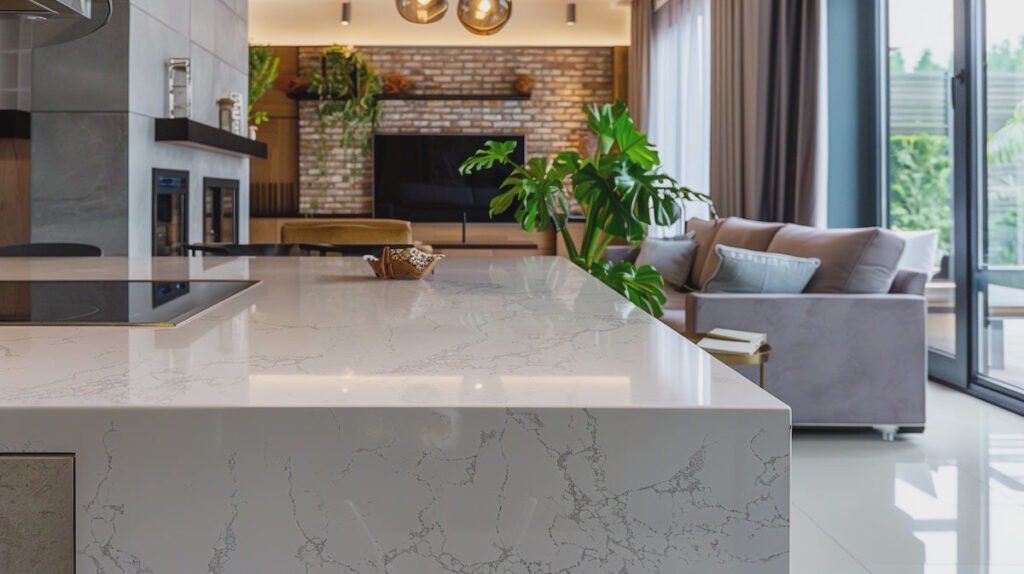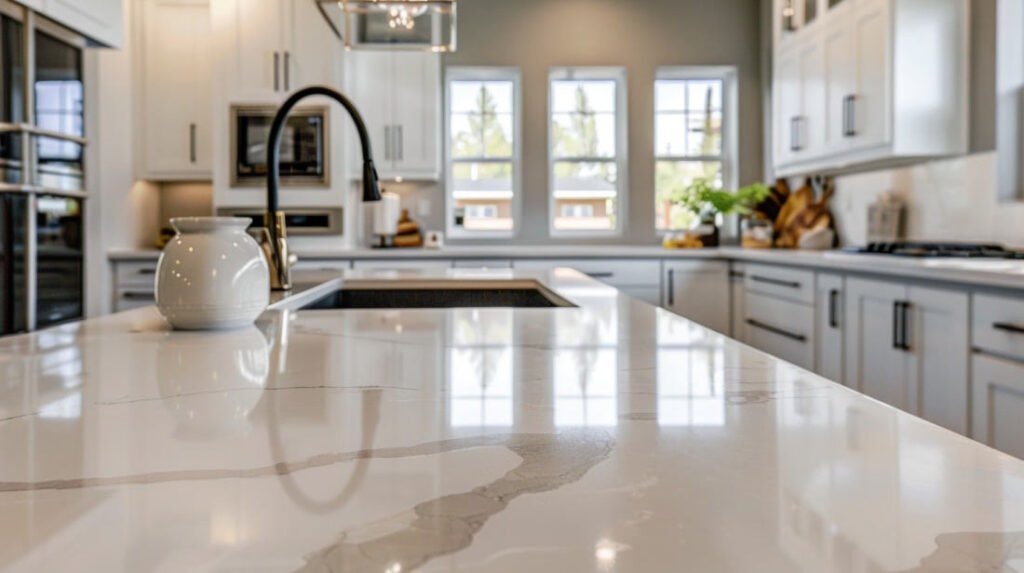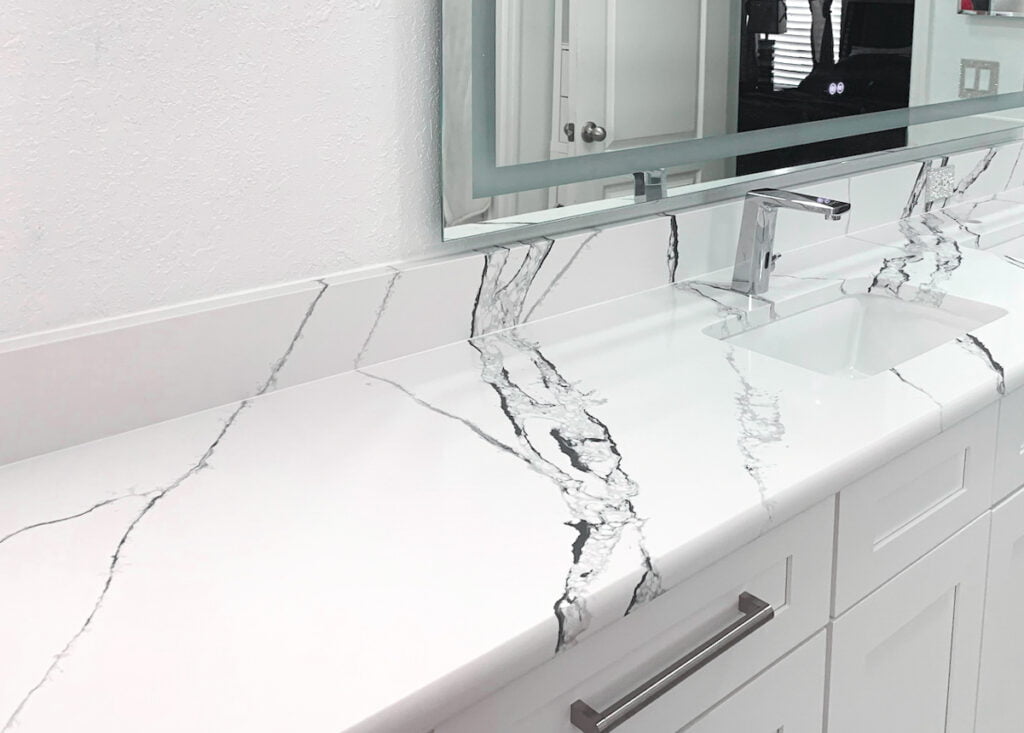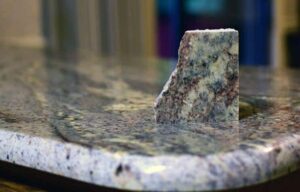Why Choose Quartz Countertops?
There are numerous countertop options available today, even if you’ve decided on a “natural stone” variety. Whether you’re considering quartz countertops, concrete countertops, or manufactured laminate countertops, it’s essential to weigh the pros and cons of each. But how do you determine which countertop is the best fit for you?
Countertop Materials
Countertops are made from a variety of materials, ranging from natural stones to man-made composites. When selecting a new countertop, you’ll need to balance your aesthetic preferences with the material’s practicality.
Popular countertop materials include ceramic tile, laminates, solid surfaces, granite, quartz, marble, and concrete. One advantage of some countertops, like quartz, is their versatility in appearance. For instance, if you love the look of marble but prefer not to have a marble countertop, you can opt for a quartz countertop that mimics the appearance of marble.

Advantages of Quartz
As previously mentioned, quartz countertops are among the many materials available for use in your home. When selecting new countertops, it’s crucial to choose the best option. Quartz countertops stand out due to their numerous advantages over other materials.
Here are some of the most significant benefits of quartz countertops:
Durability
Natural quartz is one of the hardest minerals in nature, rating a seven out of ten on the Mohs Hardness Scale, which measures mineral hardness. While you might not test this by scratching countertops, a higher Mohs rating indicates greater scratch resistance.
In comparison, marble scores a three on the Mohs scale, making it much more prone to scratching. For context, a fingernail scores a 2.5 on this scale.
Non-Absorbent
Quartz countertops are naturally non-absorbent, unlike granite, marble, or concrete. This characteristic makes them highly resistant to stains and easy to keep sanitized. The non-absorbent nature of quartz also means it is resistant to bacteria and harmful microorganisms, making it a safer choice compared to more porous materials like concrete. If you love the look of concrete but prefer a low-maintenance option, concrete-look quartz countertops offer the desired aesthetic without the upkeep.
Easy Maintenance
Quartz countertops are incredibly low-maintenance. Unlike concrete, granite, and marble countertops that require regular sealing and polishing to maintain their surface, quartz needs no such treatment. Its non-porous nature eliminates the need for sealing or polishing, and cleaning is simple with warm water and a gentle sponge or cloth, reducing the need for harsh chemical cleaners.
Customization Options
Unlike granite and marble countertops, which have limited appearance options, quartz countertops are available in a wide array of colors and designs. You can find quartz countertops in various hues and patterns to match your personal aesthetic, such as warm tones that enhance the ambiance of your kitchen or bathroom.

The Do’s and Don’ts of Maintaining Your Quartz Countertops
Proper care is essential for maintaining the beauty and longevity of your quartz countertops. Fortunately, caring for quartz is straightforward compared to many other materials.
Do’s:
- Clean Regularly: Wipe down your quartz countertops daily with a soft cloth and mild soap to maintain their shine and cleanliness.
- Use Cutting Boards: Always use cutting boards when chopping or slicing to avoid scratching the surface.
- Wipe Spills Promptly: Clean up spills immediately to prevent stains. While quartz is resistant to stains, it’s best to be cautious.
- Use Trivets and Hot Pads: Protect your countertop from heat damage by using trivets or hot pads under hot pots, pans, and appliances.
- Use Gentle Cleaners: Opt for non-abrasive, pH-balanced cleaners. Avoid using harsh chemicals or abrasive scrubbers.
Don’ts:
- Avoid Harsh Chemicals: Steer clear of using bleach, ammonia, or other strong chemicals that can damage the quartz surface.
- Don’t Use Abrasive Pads: Refrain from using steel wool or other abrasive pads, as they can scratch and dull the surface.
- Avoid Excessive Heat: Don’t place hot cookware directly on the countertop. Extreme heat can cause discoloration and damage.
- Don’t Cut Directly on the Countertop: Using knives directly on the quartz surface can cause scratches and wear over time.
- Don’t Use Wax or Polish: Avoid applying waxes, polishes, or sealants to quartz countertops, as they can create a dull film on the surface.
Conclusion
Quartz countertops offer a blend of durability, low maintenance, and extensive customization options, making them an excellent choice for any home. Their non-absorbent nature ensures resistance to stains and bacteria, while the variety of available colors and designs allows you to tailor them to your aesthetic preferences.
By following the simple care instructions, you can keep your quartz countertops looking beautiful and lasting for many years. When weighing your options, the numerous advantages of quartz make it a standout contender for your next countertop upgrade.





